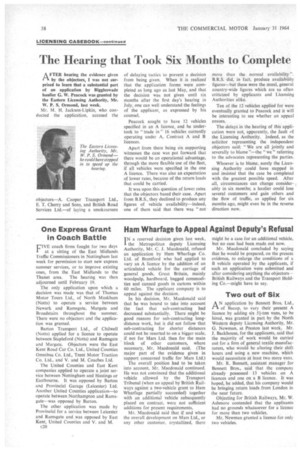The Hearing that Took Six Months to Complete
Page 40

If you've noticed an error in this article please click here to report it so we can fix it.
AFTER hearing the evidence given by the objectors, I was not surprised to learn that a substantial part of an application by Biggleswade haulier G. W. Peacock was granted by the Eastern Licensing Authority, Mr. W. P. S. Ormond, last week, Mr. M. H. Jackson-Lipkin, who conducted the application, accused the of delaying tactics to prevent a decision from being given. When it is realized that the application forms were completed as long ago as last May, and that the decision. was not given until six months after the first day's hearing in July, one can well understand the feelings of the applicant, as expressed by his counsel.
Peacock sought to have 12 vehicles specified in an A licence, and he undertook to "trade in" 16 vehicles currently operating under A, Contract A and B licences.
Apart from there being six supporting witnesses the case was put forward that there would be an operational advantage, through the more flexible use of the fleet, if all vehicles were specified in the one A licence. There was also an expectation of lower rates, because of the return loads that could be carried.
It was upon this question of lower rates that the objectors based their case. Apart from B.R.S., they declined to produce any figures of vehicle availability—indeed, one of them said that there was "not
more than the normal availability ". B.R.S. did, in fact, produce availability figures—but these were the usual, general country-wide figures which are so often criticized by applicants and Licensing Authorities alike.
Ten of the 12 vehicles applied for were eventually granted to Peacock and it will be interesting to see whether an appeal ensues.
The delays in the hearing of this application were not, apparently, the fault of the Licensing Authority. Indeed, as the solicitor representing the independent objectors said: We are all jointly and severally to blame "—the "we" referring to the advocates representing the parties.
Whoever is to blame, surely the Licensing Authority could have stepped in and insisted that the case be completed with the greatest possible speed. After all, circumstances can change consider; ably in six months; a haulier could lose several customers and gain others and the flow of traffic, as applied for six months ago, might even be in the reverse direction now.




















































































































